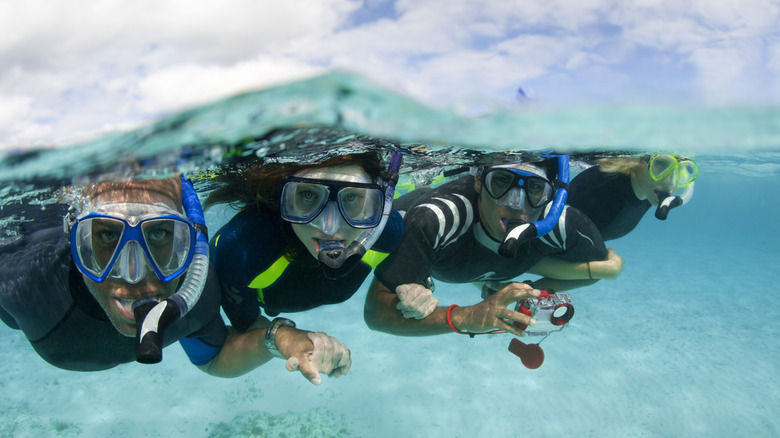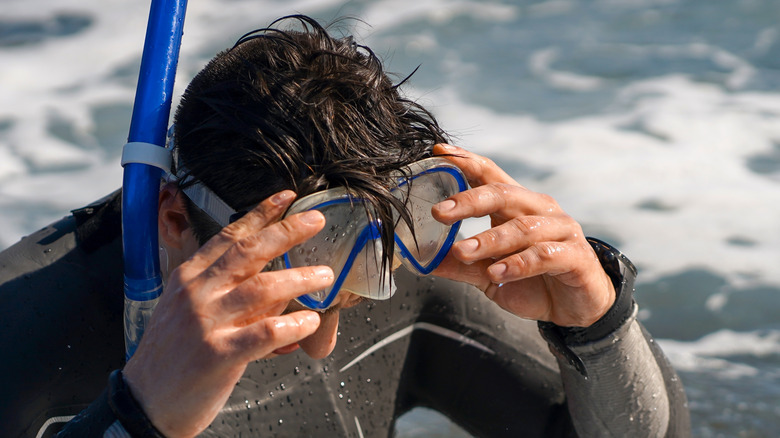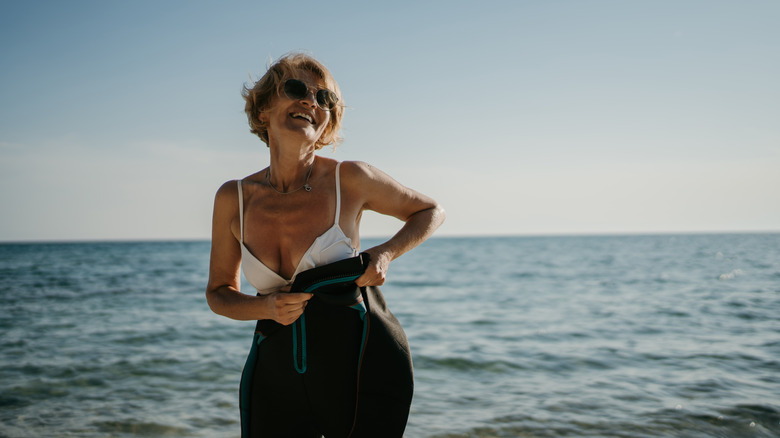The Hidden Benefits Of Snorkeling In A Wetsuit, Even In Warm Caribbean Waters
Whether you're splashing around in Hawaii or dipping in and out in the Maldives, take a look around at other visitors at some of the top-rated snorkeling beaches around the world and you might notice one major similarity: None of them are wearing wetsuits. And while the observation might not seem all that strange — it's pretty much a given that most snorkelers in tropical waters generally opt for standard swimwear — the truth is that they might be missing out on something special. Because, believe it or not, wearing a wetsuit can significantly enhance your experience underwater — even in water temperatures above 72 degrees Fahrenheit. In fact, these suits can offer some surprising advantages that go well beyond temperature regulation, especially in the warm waters of the Caribbean.
So, how exactly can wearing a wetsuit help? Well, beyond keeping you comfortable, wetsuits also provide essential protection from certain environmental elements that you might run into while exploring coral reefs and marine ecosystems. Specifically, your suit can act as a protective barrier against unexpected encounters with everything from coral to rocks, and even sea creatures. Ultimately, this allows you to focus more on the underwater spectacle and less on worrying about potential scrapes or stings.
Additionally, wetsuits also offer a practical benefit that many snorkelers overlook — better buoyancy. In most cases, wetsuits add roughly 2 to 3 pounds of buoyancy, which means you'll likely use less energy staying afloat. This extra support is a godsend for less experienced swimmers and snorkelers and can make a difference between having to head back early while everyone else continues exploring.
Other reasons wearing a wetsuit might be a good call
Beyond things like physical safety and buoyancy support, slipping into a wetsuit for a tropical snorkeling session also comes in handy for a handful of things. For starters, a well-fitted wetsuit can actually help improve your overall swimming (and snorkeling) technique, and make you more efficient in the water. This is because the gentle compression provided by the suit helps you maintain a proper position, which is great for more effortless swimming and keeping your mask at the perfect angle to maximize underwater visibility.
Additionally, for snorkelers concerned about sun exposure, a wetsuit can also be a practical solution that eliminates the need to constantly reapply sunscreen in between swims. Not only is this convenient in terms of the effort it takes to climb out of the water, dry off, and bend and twist to reach that spot on your back, but it's also a responsible choice that can help protect coral reef systems from the harmful chemicals typically found in most commercial sunscreen brands.
Not all wetsuits are created equal
If all this talk about wetsuits has you convinced, it's important to note that choosing the right one for your needs isn't just about picking any 'ole suit off the rack. For warm Caribbean waters, you'll ideally want to look for suits between 0.5 millimeters to 2 millimeters thick that provide all the benefits of wearing a wetsuit without the bulk or excessive warmth. Plus, wearing a thinner material also allows for greater flexibility, which will then make it easier to swim, twist, and turn underwater.
Additionally, the way your wetsuit fits can also impact how you feel. Put simply, a proper wetsuit should feel like a second skin — with no sagging or excessive bunching in the arms or legs. If it's too loose, water will constantly flush through the suit and affect things like buoyancy and protection; too tight, you'll find your movement restricted. Lastly, zippers and seams also matter. While back-zip styles might be easier to get in and out of, chest-zip designs generally provide better flexibility around the shoulders. This is an important factor when you're going to be spending hours paddling at the surface looking down at coral reefs while exploring some of the best snorkeling spots in the world.


